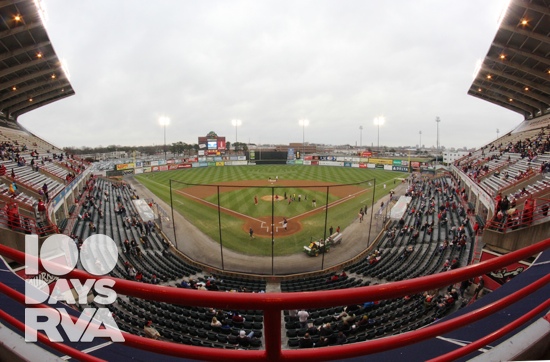Day #020: Build a stronger culture of inclusivity for individuals with disabilities
Where can someone in a wheelchair get coffee or a beer at a bar without the fear of getting elbowed in the head?

Inspired by Michael Bierut’s 100 Day Project, 100 Days to a Better RVA strives to introduce and investigate unique ideas to improving the city of Richmond. View the entire project here and the intro here.
- Idea: Take steps both small and large to build a culture of inclusivity for residents with disabilities.
- Difficulty: 1-5 — Enhancing websites and improving our culture of inclusivity doesn’t cost much while funding GRTC CARE costs a small fortune.
Saturday, July 26th is the 24th anniversary of President George H.W. Bush signing the Americans with Disabilities Act in to law. On Tuesday, the Huffington Post did a great job chronicling how the ADA has improved access but has also caused the employment rate of workers with disabilities to slide. There’s still reason for hope–several important pieces of legislation are tackling the issue at the federal level–but RVA can do plenty on a local level without acts of Congress or billion dollar budgets.
Manchester United plays at Old Trafford in Manchester, England. Their organization, the Manchester United Disabled Supporters’ Association is simply inspiring. Old Trafford has 120 wheelchair places in the stadium with seats for assistants (in addition to 85 accessible boxes), 20 seats for visually impaired supporters with seats for personal assistants, free audio match day programs, and even a bar solely for people in wheelchairs so they don’t get elbowed in the head. This only scratches the surface of their culture of inclusivity.
These policies aren’t in place so Manchester United can pat themselves on the back–they are good for business. The waiting lists are long, demand is high, and competition can’t keep up with the unique services they offer. Manchester United is one of the most valuable sports franchises in the world, so they could easily make the investment in 1989 to create this unique environment, but many of the things they did don’t have to be expensive.
The simplest thing they do is inform through a well-built and inviting website. MUDSA’s website is full of smiling faces, calls-to-action, and ways for people to get involved. The Richmond Coliseum, Robins Center, and Siegel Center1 all list accessibility information in guests’ services sections–where it should be listed, but limiting it solely to the area between “Weapons” and “Wi-fi Network” doesn’t scream, “welcome.”
The most important action MUDSA took was seeking out the input of people with disabilities in 1989. People without disabilities can join MUDSA and MUDSA 100 is a lottery system used to fundraise. Half of every 18 pound entry to the MUDSA 100 club goes into a lottery while the other half benefits accessibility.
Manchester United is blazing the trail while doing quality business, but what is our obligation as a society when it doesn’t make good business sense to go the extra mile–when building a culture of inclusivity means taking a loss? What are we supposed to do when ADA compliance seems more like a barrier to entry than a customer or employee-empowering investment? On that admittedly can negatively impact a business’s success or open them up to litigation?
Transportation is one of the biggest issues facing people with disabilities. Right now, it isn’t profitable for the Greater Richmond Transit Corporation to provide comprehensive transportation to people with disabilities. The GRTC CARE program takes on huge losses.
With current service, it’s difficult to get from many residential places to the West End and deeper Southside where many jobs are located. If individuals can’t get to their jobs, they can’t help build the bus service. If they can’t help build the bus service, they can’t get to their jobs. It’s a vicious cycle with no clearcut affordable answers, but the question does not enter the public forum enough. Maybe the city can adopt a lottery system similar to MUDSA in order to maintain or even expand the footprint2.
Whether it’s businesses cross-subsidizing accessibility with higher prices or simply putting up an infographic in the kitchen reminding wait staffs that customer with muscular dystrophy may need help opening straws, there are plenty of private-sector solutions available.
Where to draw the line between societal responsibility and personal responsibility is an almost impossible question. I don’t know the answer–but I do know that Richmond can do a better job, formally and informally, increasing access to jobs, improving experiences at restaurants and venues, and most importantly building a culture of inclusivity for what one contributor called the “the most under-represented and least protected minority group in the country.”
Chris Crowley, Susan Howson, and one person who prefers to remain anonymous contributed to this article; however, the entirety of the article does not directly reflect their individual beliefs.
Love this idea? Think it’s terrible? Have one that’s ten times better? Head over to the 100 Days to a Better RVA Facebook page and join in the conversation.
Photo by: Gamma Man
- This isn’t to criticize those three venues. The Siegel Center still has spots marked on the ground in the north-east corner where two fans who died from muscular dystrophy used to sit.
- This violates Virginia Gambling Laws but maybe an exception could be made such as in the case of the state lottery which benefits education. ↩
-
Recommend this
on Facebook -

Report an error
-

Subscribe to our
Weekly Digest





Notice: Comments that are not conducive to an interesting and thoughtful conversation may be removed at the editor’s discretion.